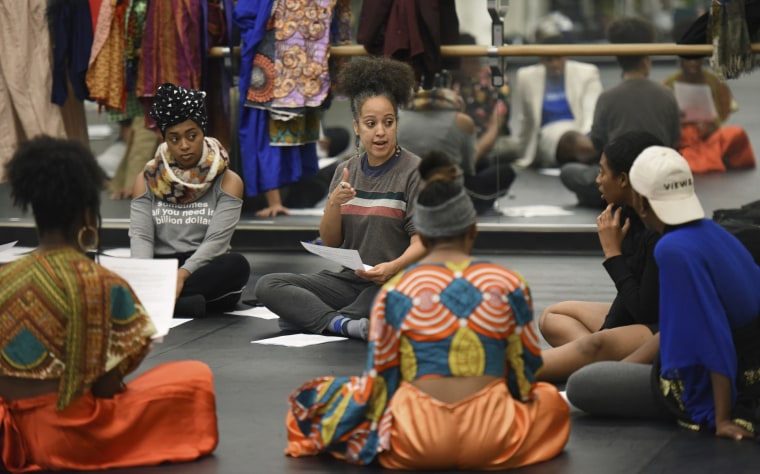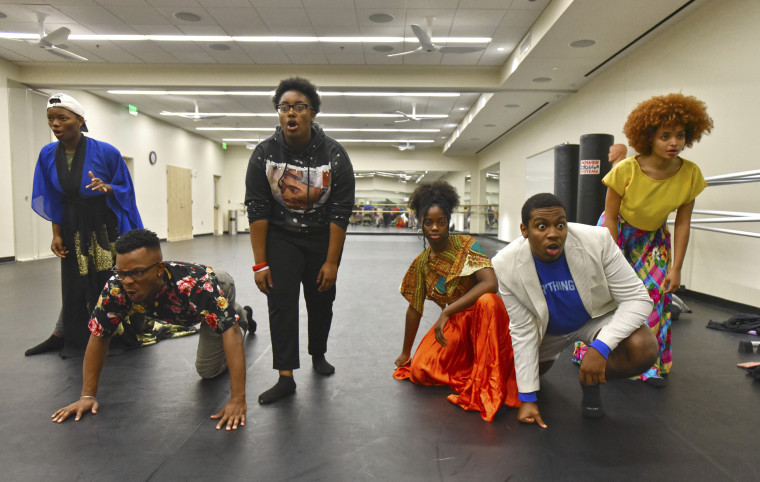ATHENS, Ga. — About 30 people stood silently as a haunting noise, much like a prison chain gang at work on a railroad line, filled the air.
Moments later, several people ran across the room, their arms flailing as if they're unsure where they should go.
About a minute later, everything stopped.
The action was part of a rehearsal for a unique collaboration involving a racially diverse group of about three dozen students and faculty at Morehouse and Spelman colleges and the University of Georgia. The students and faculty hope the performance about Georgia's treatment of prisoners will spark a conversation with audience members about incarceration, the role of race in sentencing and prison labor — past and present — through dance and dramatic performance.
Their work, "By Our Hands," premiered on Nov. 8 at the UGA Theatre and will have three additional free performances in Athens later this month. Four performances are scheduled at Spelman in February.
"The production does a good job of not necessarily saying what has to happen, but giving a good perspective on all these stories," said Cydney Seigerman, 28, a third-year UGA graduate student.
Others say it's encouraged them to get more involved in prison reform.
"I didn't think of prison reform the way I do now, and I am so for it," said Cymiah Alexander, 18, a first-year Spelman student.
The Georgia Incarceration Project, as it is called, used archived records, artifacts housed at UGA and interviews with incarcerated students enrolled in courses through Common Good Atlanta to create the production. The idea came more than a year ago from a UGA collection called "The New South and New Slavery: Convict Labor in Georgia" that focused on prison labor after slavery, during Reconstruction and through the end of the chain gang era. The collection included shackles and whipping reports.
UGA and Spelman faculty talked about how they could use the material from the collection to tell its story. About two dozen students from the three schools are the main performers. Other students have helped write parts of the script, through their own study of the collection.
Translating archived papers to a script presented several challenges.
"How can we bring emotion to the history of the archives?" asked Julie B. Johnson, a senior lecturer at Spelman who is one of the directors of the performance.
In recent years, one of the few areas where lawmakers from both major political parties have agreed on changes has involved the prison system. In Georgia, state leaders have increased funding for accountability courts to find alternatives to prison for some nonviolent drug offenders. The Trump administration has embraced similar efforts through the First Step Act. Atlanta Mayor Keisha Lance Bottoms has pushed an ongoing effort to close the city's jail and find other uses for the building, as part of the city's criminal justice reform plan.

One approach to prison reform has been to educate the incarcerated. A Ken Burns-produced documentary on a New York program where some inmates have earned college degrees from faculty at Bard College is set to premiere later this month. A group of UGA students tutors Athens-area inmates seeking their GEDs.
The UGA students made several trips to Spelman for rehearsals. The eyes of UGA student Brett Green, who is African American, widened excitedly as he talked about the "black excellence" he has seen at Spelman and Morehouse, the academically acclaimed historically black colleges.
The students say they've built friendships and learned more about themselves. Each student had to display a skill they had at the outset of rehearsals. Many learned additional skills through devised theater, the improvisational method the team used to create the performance.
The material in the Georgia performance is intense. Students felt the shackles worn by chain gang members. There have been tears at some rehearsals, students said.
"It's physically and emotionally heavy," said Johnson.
"It's a lot to think about," said Nosayaba Okungbowa, 20, a fourth-year UGA student.
Throughout the rehearsals, the students repeatedly ask themselves questions such as what has incarcerated labor done to themselves, the state, the nation. For Green, it's a reminder of the discussion at UGA about how slavery helped the university. UGA is seeking faculty proposals to research that history.
The students have some opportunities to release. They gathered in a circle after a break from a Saturday rehearsal and did some improv. Robert Rucker, 22, a Morehouse senior, pretended he was about to give birth.
"I can't breathe," Rucker exclaimed to laughter from the group.
The energy in the room was up. It was now time to work. Amma Y. Ghartey-Tagoe Kootin, assistant professor in UGA's Department of Theater and Film Studies along with its Institute for African American Studies, gave instructions for the next scene.
"Get it?" she asked.
"Got it," the students replied.
"Good," she said.
Alexander began the performance during a recent rehearsal. She swayed slowly around several performers who stretched their hands to the sky, reaching for the archives.
"We are engaging in a deeper examination of truth," Alexander said as Kootin directed her steps.
Alexander stared at the imaginary audience, urging them to have an open mind.
"The journey is not linear," she said. "There is no end."
Prison labor in Georgia dates back more than a century. Archived photos show men in black and white striped jumpsuits, doing work such as building railroad tracks or other state construction projects. Books such as "I Am a Fugitive From a Georgia Chain Gang!" and "Georgia (Expletive)" written in the early part of the 20th century shared accounts of brutal working conditions.
Today, about 5,000 offenders work on prison farms or in preserving, preparing and serving foods, according to the Georgia Department of Corrections. Another 1,400 offenders receive on-the-job training in areas such as metal fabrication, woodworking, upholstery and license plates.
Students say they've had discussions with classmates and others who see long sentences and prison labor as appropriate punishment for criminal convictions.
"Why does that concern you? It is what it is. They shouldn't have done it," Green, 19, a second-year UGA student from Augusta, has heard.
Green has a different perspective. He and Okungbowa talk about the "black codes," laws passed after slavery. They cite cases they read in the archives where African Americans were put in prison for loitering or whistling too loud. A 12-year-old, they said, was the youngest inmate.
"Slavery was indeed still there, but it went by a different name. It's just insane it was allowed to go on for that long," Green said.
"And the effects are still seen today," Okungbowa continued.
The students are eager to share what they have learned.
"I just think of all the people whose stories are not told and . . . want people to come out and see it," she said.
